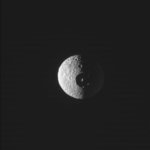Mimas (moon)
|
|
| Missing image Mimas_moon.jpg Mimas, as imaged by Voyager 1 in 1980 (NASA) | |
| Discovery | |
|---|---|
| Discovered by | William Herschel |
| Discovered on | September 17, 1789 |
| Orbital characteristics | |
| Semimajor axis | 185,404 km |
| Eccentricity | 0.0202 [1] (http://exp.arc.nasa.gov/downloads/celestia/data/solarsys.ssc) |
| Orbital period | 0.9424218 d [2] (http://exp.arc.nasa.gov/downloads/celestia/data/solarsys.ssc) |
| Inclination | 1.51° (to Saturn's equator) |
| Is a satellite of | Saturn |
| Physical characteristics | |
| Mean diameter | 397.2 km |
| Mass | 3.84×1019 kg |
| Mean density | 1.17 g/cm3 |
| Surface gravity | 0.077 m/s2 |
| Rotation period | synchronous |
| Axial tilt | zero |
| Albedo | 0.77 |
| Atmosphere | none |
Mimas (mye'-mus, Greek Μίμας) is a moon of Saturn that was discovered in 1789 by William Herschel.
.
| Contents |
Physical characteristics
Mimas' low density (1.17) indicates that it is composed mostly of water ice with only a small amount of rock. Due to the tidal forces acting on it, the moon is not perfectly spherical; its longest axis is about 10% longer than the shortest. The somewhat ovoid shape of Mimas is especially noticeable in recent images from the Cassini probe.
Mimas' most distinctive feature is a colossal impact crater 130 km across, named Herschel after the moon's discoverer. Herschel covers almost a third of the diameter of the entire moon; its walls are approximately 5 km high, parts of its floor measure 10 km deep, and its central peak rises 6 km above the crater floor. If there were a crater of an equivalent scale on Earth it would be over 4000 km in diameter, wider than Canada. The impact that made this crater must have nearly disrupted Mimas entirely; fractures can be seen on the opposite side of Mimas that may be due to the shock waves from the impact travelling through the moon's body.
The surface is saturated with other smaller impact craters, but no others are anywhere near the size of Herschel. Although Mimas is heavily cratered, the cratering is not uniform. Most of the surface is covered with craters greater than 40 km in diameter but in the south polar region, craters greater than 20 km are generally lacking. This suggests that some process removed the larger craters from these areas.
Scientists officially recognise two types of geological feature on Mimas: craters and chasmata (chasms). See also: List of geological features on Mimas.
The Cassini orbiter is due to perform a flyby of Mimas on August 1, 2005
Name
The moon is named after Mimas, a son of Gaia in Greek mythology. The adjectival form is Mimantean. It is also designated Saturn I.
The name "Mimas" and the names of all seven satellites of Saturn then known were suggested by Herschel's son John Herschel in his 1847 publication Results of Astronomical Observations made at the Cape of Good Hope ([3] (http://adsabs.harvard.edu//full/seri/MNRAS/0008//0000042.000.html))
Mimas in Fiction and Film
Mimas_deathstar.jpg
- Comparisons have been made between Mimas' appearance and the appearance of the Death Star from the movie Star Wars (see picture). However, this is merely a coincidence, as Mimas was not photographed until three years after the release of the film.
- In the novels of Rob Grant and Doug Naylor based on their sitcom Red Dwarf, Mimas is the site of a large, congested spaceport from which Dave Lister escapes as a stowaway and begins his journey on the Red Dwarf. Both the book and the series refer to the local delicacy "Mimean Bladderfish".
- An episode of Star Trek: The Next Generation features Mimas as the site of an evacuation station to which four Starfleet cadets, including Wesley Crusher, transport after their vessels collide.
External links
- The Planetary Society: Mimas (http://www.planetary.org/saturn/mimas.html)
- The Nine Planets - Mimas (http://www.nineplanets.org/mimas.html)
- Views of the Solar System - Mimas (http://www.solarviews.com/eng/mimas.htm)
| Saturn's natural satellites |
|---|
| Janus' group | Mimas | Enceladus | Tethys | Dione | Rhea | Titan | Hyperion | Iapetus | Inuit group | Gallic group | Norse group |
de:Mimas (Mond) es:Mimas (Moon) fi:Mimas fr:Mimas (lune) ja:ミマス (衛星) nl:Mimas (maan) pl:Mimas (księżyc) zh:土卫一

